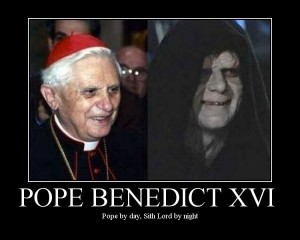
SteveMcCabe.net...
...being the online presence of Steve McCabe himself
On Francis, the pope we needed.
May 27th, 2013Pope Francis has been in the job barely a couple of months, and already the man is proving himself, with some high-quality poping to be a powerful force for good in a Church that has long need some powerful good.
The stories of his humility, his down-to-earth-ness, his humanity, were legend before the white smoke of his election had cleared. That he walked to his cardinals to receive their allegiance, rather than have them climb steps to his throne, was emblematic of what was to come. That he took the time to phone his newsagent in Buenos Aires to cancel his paper delivery speaks of a man who has not — at least not yet — forgotten who he is. That he has declined to move into the Papal Palace of the Vatican, staying in a much smaller set of rooms, puts a tiny bit of substance behind his insistence that the Church must belong to the people, to the poor.
All of this, of course, could simply have been window-dressing, a bit of honeymoony infatuation before Francis disappeared behind the walls of the Vatican. But, in one of his first major policy statements, Francis has shown that he understands the message he is supposed to be sending. While his predecessor, Benedict XVI, had a worrying tendency to disappear up his own theology, Francis has demonstrated profound insight and clarity by announcing that atheists — atheists! — can, just as much as the most devout God-botherer, be good people.
A simple, but a wonderfully profound, pronouncement. At last, it is refreshing to see a Pope who actually teaches what Jesus taught — after all, isn’t that what the Pope is supposed to be teaching? And Jesus was very, very clear on the matter. Read the Gospels, and you’ll see a consistent message, a social gospel that talks about caring for others, for love and compassion, for — and I’ll lose the Lutherans and Protestants here, I know, but that can’t be helped — good works. Read the Sermon on the Mount (go on, read it — it’s really rather cool; you’ll find it in chapter 5 of Matthew) and you’ll see a whole list of ways that you can be the person God wants you to be, and you’ll not see anything in there that talks about orthodoxy of belief, about doctrine, about the Trinity or the Immaculate Conception or — no, you won’t, not unless you work really hard to force it to be there — anything about salvation through faith. Instead, you’ll see a very simple, very elegant outline of what it means to be a follower of Jesus, a Christian; you’ll also see that being Christian means doing Christian.
And this is where Francis has nailed it. Francis understands that, as the old joke goes, going to church makes you Christian no more than standing in a garage makes you a car. It’s the doing that makes you Christian — or, rather, a good person, because, as Francis wants us to understand, Christians do not have a monopoly on goodness. “Just do good,” says Francis to the atheist, “and we’ll find a meeting point.” Building bridges, after all, is what a pope — a pontifex, a bridge-builder, should be doing.
To be fair, “doing a better job than the last pope,” at the very least, hasn’t been a difficult job for a very long time. Francis’s two predecessors, John Paul II and Benedict XVI, both failed to impress. John Paul II, in particular, did more damage to the Roman Catholic Church than most people are ever willing to concede. While the Church, across wide swathes of the developed world, was riddled with the cancer of child abuse, he was more concerned with women priests. In 2005, he excommunicated seven women who claimed to be ordained priests, with Cardinal Joseph Ratzinger, who succeeded him as Pope Benedict XVI, saying that they had “wounded the Church;” to the best of my knowledge not a single cleric has been excommunicated for either interfering with children or failing to interfere with those who did — presumably, they insufficiently wounded the Church. While Francis has shown that his first concern is with the poor of the developing world — his old parish, indeed — John Paul II was more concerned with censuring liberation theologians like Leonardo Boff that with recognising that liberation theology more closely cleaves to the teachings of Jesus than anything the Pope himself was doing. And behind John Paul II was the figure of Benedict XVI, who, as Cardinal Ratzinger, headed up the Sacred Congration for the Doctrines of the Faith — effectively the modern-day Spanish Inquisition — and encouraged and implemented many of his boss’s more obnoxious clampdowns. His eight years were marked by the treading of ecclesiastical water for the most part, with the occasional spot of Muslim-baiting and a rather disappointing drift towards the pre-Vatican II pomposities that drove a wedge between God and His people.
When Benedict XVI announced earlier this year that he was to retire, I felt the same hope that I’d felt during the conclave that had elected him in 2005, a hope that maybe we’ll get a Pope who gets it; this time, however, that hope was fulfilled. Francis has given a fantastic account of himself so far.


Leave a Reply